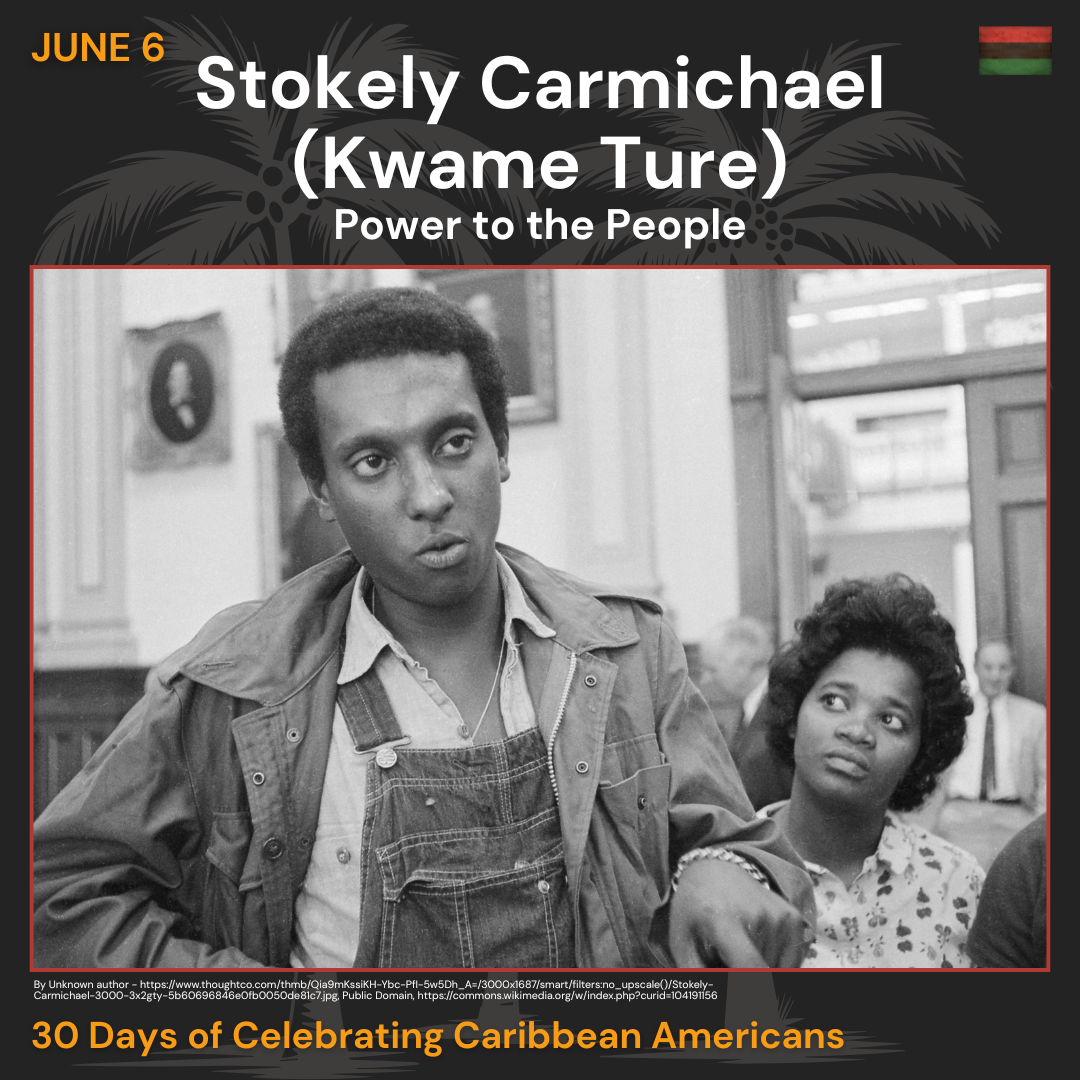Day 6. Stokely Carmichael (Kwame Ture) Power to the People

Today we honor Stokely Carmichael, later known as Kwame Ture, a fearless revolutionary and masterful orator born in Port of Spain, Trinidad in 1941. After emigrating to the United States as a child, Carmichael became a central figure in the U.S. civil rights and Black liberation movements—uniting his Caribbean roots with a Pan-African future.
Revolutionary Spirit, Global Vision
Today we honor Stokely Carmichael, later known as Kwame Ture, a fearless revolutionary and masterful orator born in Port of Spain, Trinidad in 1941. After emigrating to the United States as a child, Carmichael became a central figure in the U.S. civil rights and Black liberation movements—uniting his Caribbean roots with a Pan-African future.
Carmichael is most famously remembered for popularizing the slogan “Black Power” during a 1966 march in Mississippi with the Student Nonviolent Coordinating Committee (SNCC), where he served as chairman. Though the phrase sparked controversy, it also ignited a global call for self-determination, racial pride, and community control.
“We have to talk about bringing the Black community to self-determination and control. Black Power is not anti-white—it is pro-Black.” — Stokely Carmichael
From Civil Rights to Global Liberation
Carmichael’s leadership with SNCC, the Freedom Rides, and later with the Black Panther Party, made him a prominent and sometimes polarizing figure. He ultimately broke with nonviolent tactics, arguing that systemic change required more than moral appeals—it demanded radical transformation.
In the 1970s, he relocated to Guinea, West Africa, adopted the name Kwame Ture, and worked alongside Pan-African leaders such as Kwame Nkrumah and Sekou Touré. There, he helped found the All-African People’s Revolutionary Party, continuing his fight for liberation across continents.
“The capitalist system does not lie some of the time; it lies all of the time.” — Kwame Ture
Stories of Strategy and Solidarity
Carmichael’s life is a story of unwavering dedication to justice. From being jailed over 29 times during the Freedom Rides, to coining a term that shifted Black consciousness globally, to organizing in Africa until his death in 1998, he remained steadfast in his belief that Black people must control their own destinies.
His call was always for unity, action, and the dismantling of all forms of oppression—racism, imperialism, capitalism, and colonialism.
“The only way we’re gonna stop them white men from whuppin’ us is to take over. What we gonna start saying now is Black Power!” — Stokely Carmichael, 1966
Learn More About Kwame Ture
📚 Books and Writings:
– Ready for Revolution: The Life and Struggles of Stokely Carmichael (Kwame Ture)
– Stokely Speaks: From Black Power to Pan-Africanism
– The Black Power Mixtape (Documentary)
🎧 Watch and Listen:
– Black Power Speech, 1966, audio available on YouTube.
– Podcast: CodeSwitch: Stokely Carmichael, A Philosopher Behind The Black Power Movement
🏛️ Explore Online:
– The Kwame Ture Archives at the UCLA LIbrary hosts Ture’s writing, speeches, documentary video, and other artifacts from his work as an activist.
Today’s Reflection
Stokely Carmichael taught us that liberation is global, that slogans become movements, and that true justice demands boldness and clarity. His insistence on power for the people—Black people, colonized people, working people—continues to shape the struggles for justice today.
💬 How are we continuing the legacy of Black Power in our movements for change?
💬 What does Kwame Ture mean when he says Black Power is not anti-white, but pro-Black?
Next, we’ll take a look at the work of Sylvia Wynter, a writer and thought leader on decolonization.
Join us each day this month as we spotlight a different Caribbean American whose legacy calls us to reflect, learn, and celebrate. These stories are about community, culture, and the contributions that come from the rich intersections of heritage and homeland. Our weekly themes will help guide us through different aspects of Caribbean American influence—from activism to art, invention to entrepreneurship—creating a mosaic of identity that is as joyful as it is complex.
Learn More: Student Nonviolent Coordinating Committee – SNCC Legacy Project works to amplify the Black Power Movement online
For more information and access to other events, sign our Guestbook!
Discover more from SepulvedaUU
Subscribe to get the latest posts sent to your email.
